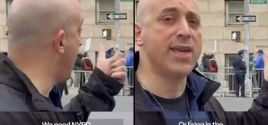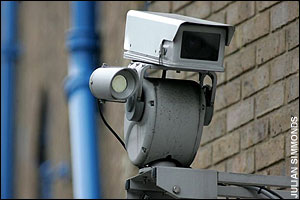Majority of UK's CCTV cameras 'are illegal'By Tim HallTelegraph Jun. 01, 2007 |
Popular 
ADL Urged Congress to Pass FISA Law Spying on Americans to 'Protect Israel'

Rep. Thomas Massie Warns Congress is Trying to Pass Hate Speech Laws to Outlaw Criticism of Israel

'Sniper Seen on Roof Overlooking Pro-Palestine Protest' at Indiana University

Mike Johnson Pushes Debunked Lie That Israeli Babies Were 'Cooked in Ovens' On October 7

Claim Jewish Student Was 'Stabbed In The Eye' by Pro-Palestine Protester Draws Mockery After Video Released
  The vast majority of Britain's CCTV cameras are operating illegally or in breach of privacy guidelines, a new watchdog has warned. The vast majority of Britain's CCTV cameras are operating illegally or in breach of privacy guidelines, a new watchdog has warned.Up to 90 per cent of surveillance cameras may be breaching the Information Commissioner's code of practice laid down to stop cameras being used inappropriately. Even more seriously, a large proportion of the UK's 14.2 million cameras breach the Data Protection Act and so are illegal, the watchdog CameraWatch warned. The illegality of many cameras will lead to future clashes in court and possible acquittals of suspects, predicted the organisation's chairman Gordon Ferrie. Mr Ferrie, a former policeman, said: "Our research shows that up to 90 per cent of CCTV installations fail to comply with the Information Commissioner's code of practice, and that many installations are operated illegally. "That has profound implications for the reputation of the CCTV and camera surveillance industry and all concerned with it." Mr Ferrie added that CameraWatch, a non-profit making independent body, is not against CCTV as a crime-fighting tool, and said that surveillance pictures are as useful to police as DNA forensic evidence. "There is nothing better than actually seeing someone commit the crime," he said. "All we are asking is that the images that are taken are compliant with the Data Protection Act." Under the code of practice and according to the Data Protection Act, CCTV cameras must be visible with clear signs. In addition, camera operators have an obligation to stop images of individuals being seen by third parties. Mr Ferrie said that operators most commonly breach these rules by not keeping recorded tapes secure, meaning they could potentially be stolen. The rise of digital cameras opens up further problems because the images can easily be shared as digital files rather than remaining on a closed loop. Defence counsels in court could theoretically question the legality of CCTV pictures in order to have the evidence dismissed or the case thrown out. The issue has not yet been tested in court, but one such case could set a precedent throwing into doubt the whole surveillance network. However, the Information Commissioner's Office today denied that CCTV rules are being broken on a large scale. Ken Macdonald, Assistant Information Commissioner for Scotland, said: "We welcome the initiative by CameraWatch to promote compliance with the Data Protection Act. "We are not aware of any evidence that supports the suggestion that 90 per cent of CCTV cameras are not complying with the ICO Code of Practice. We don't believe there is any such evidence. "Where we receive complaints that CCTV is being used in breach of the Data Protection Act we will investigate. We have a range of enforcement powers at our disposal." |



